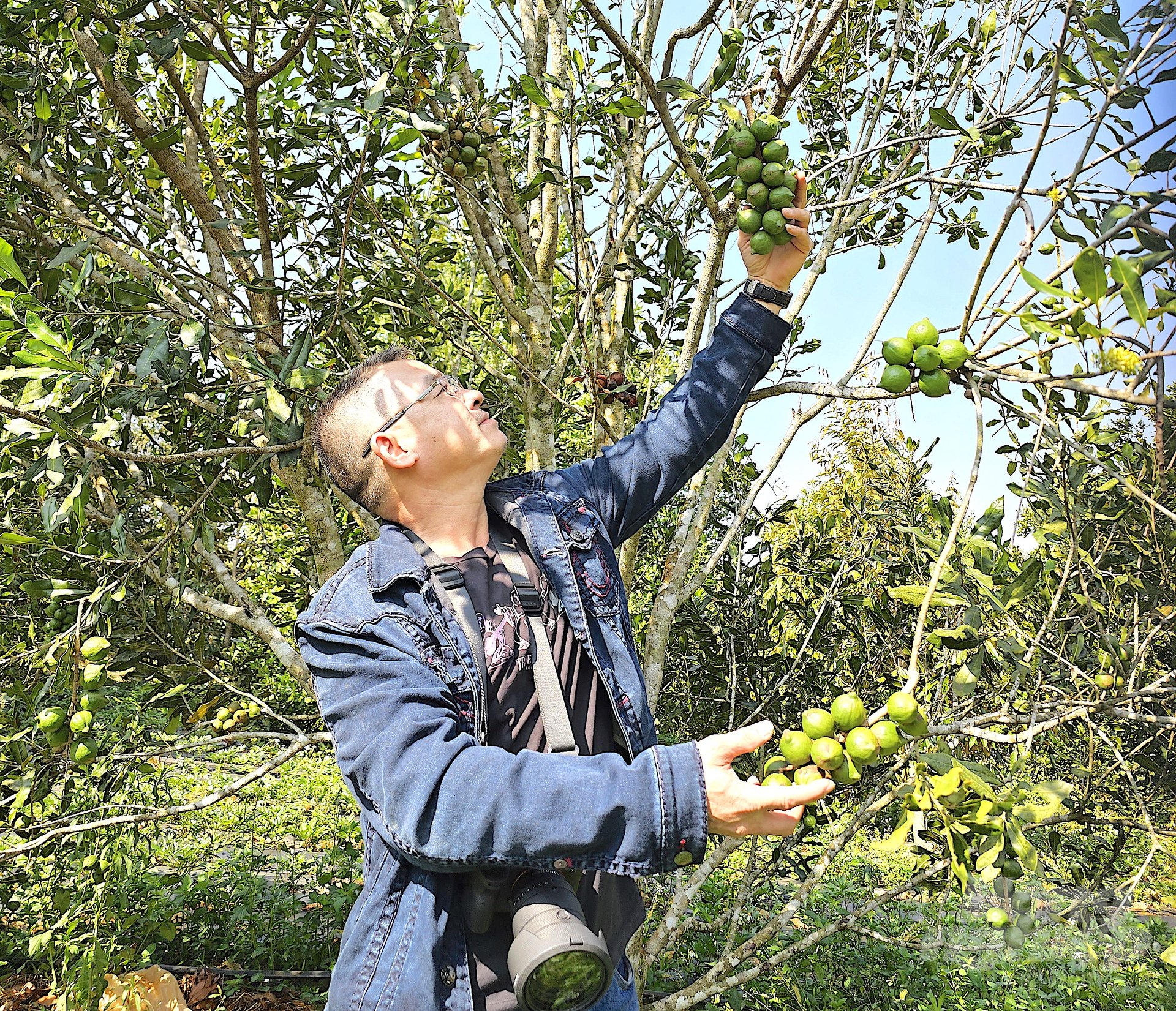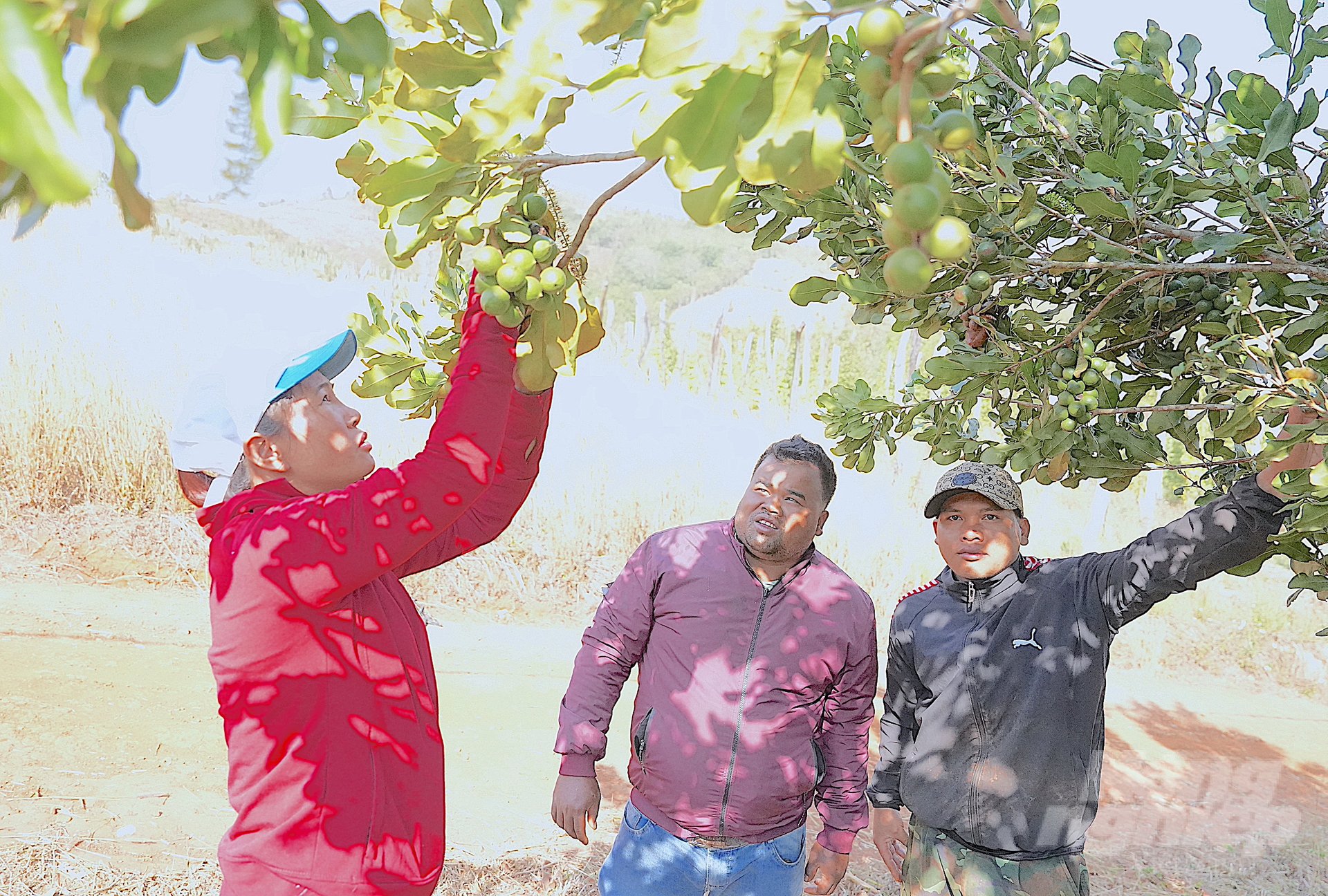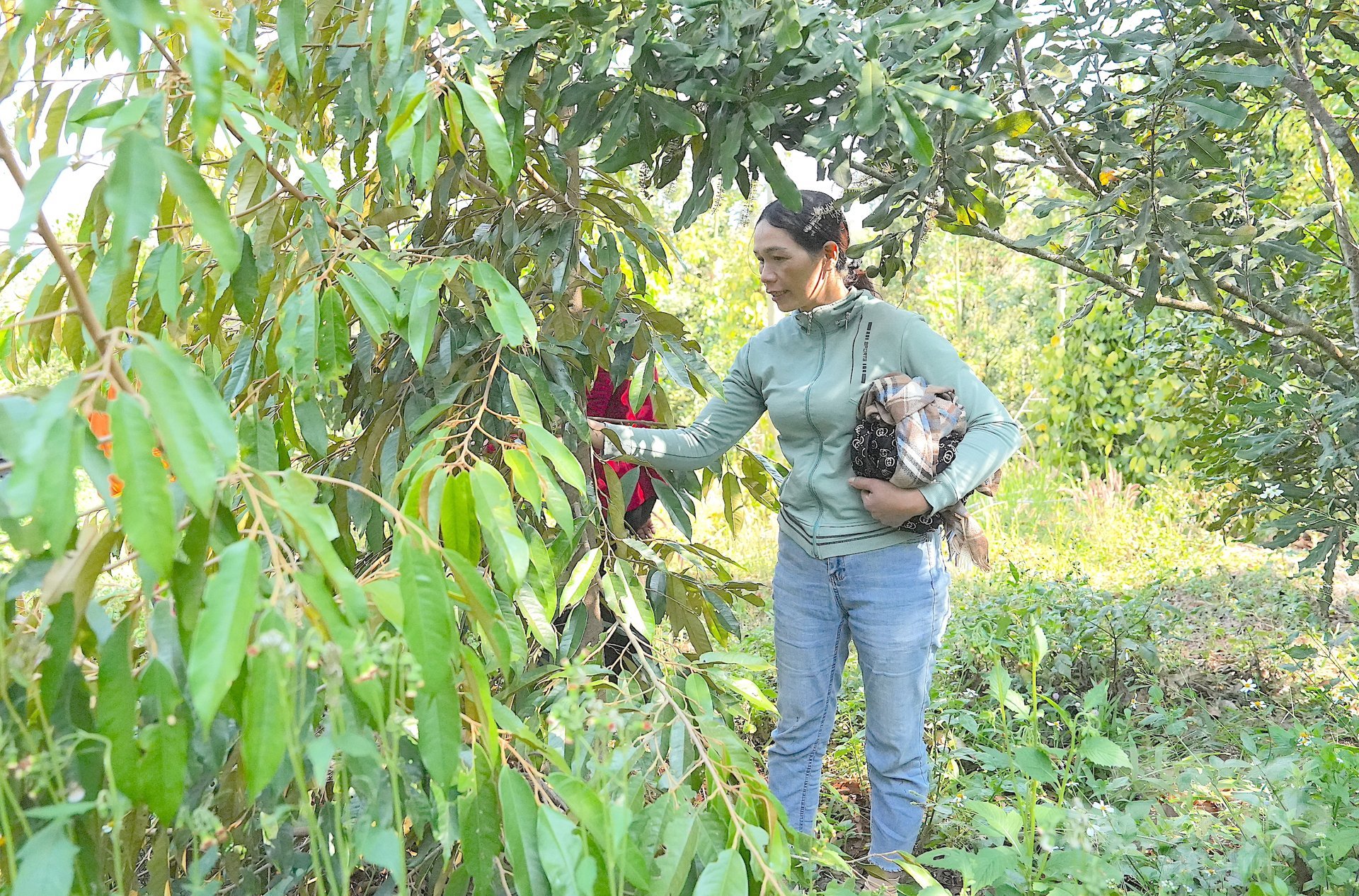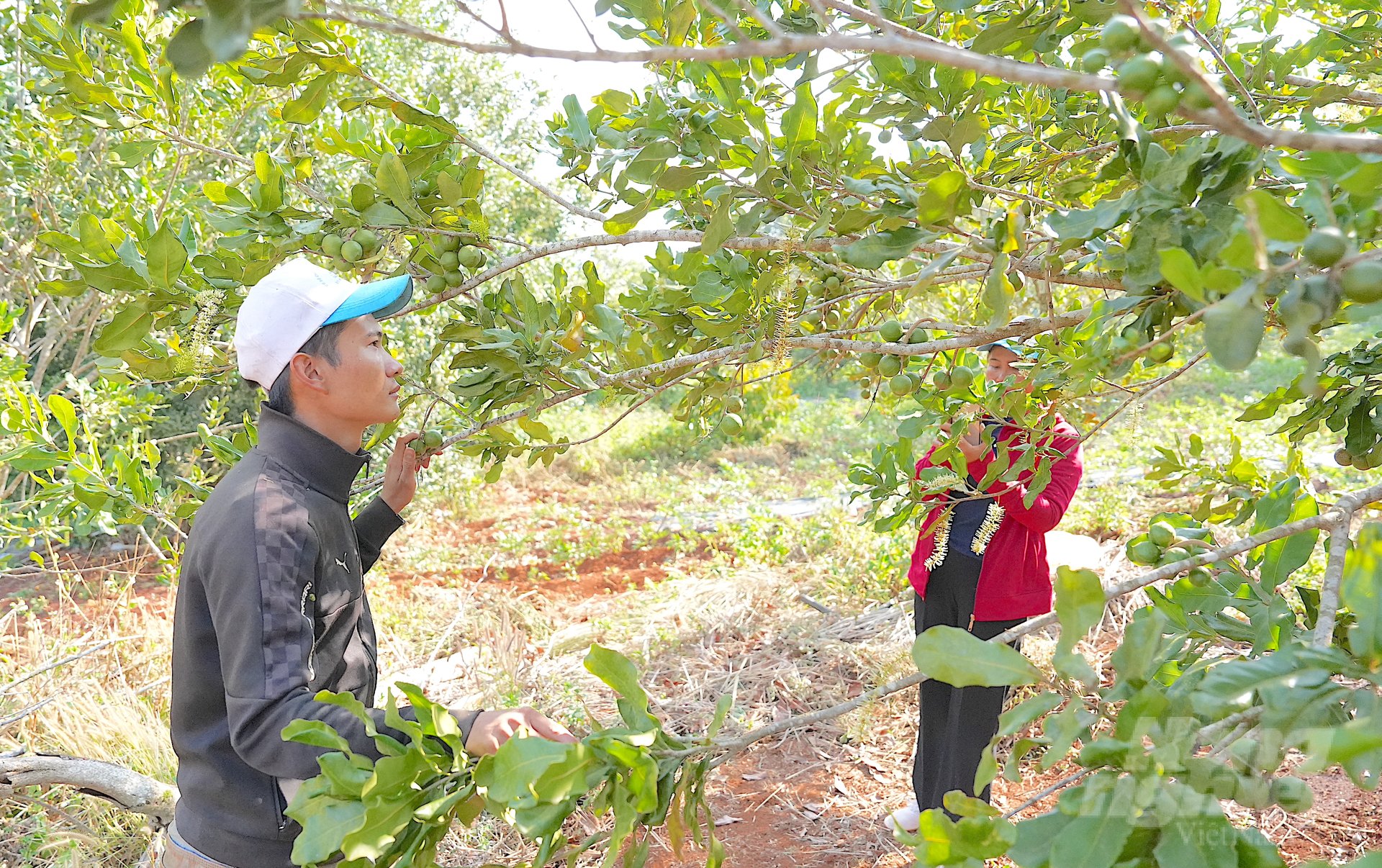May 31, 2025 | 06:28 GMT +7
May 31, 2025 | 06:28 GMT +7
Hotline: 0913.378.918
May 31, 2025 | 06:28 GMT +7
Hotline: 0913.378.918
Currently, Dak Nong province is developing a plan to develop Tuy Duc district into the province's macadamia "capital" towards organic and sustainable farming.
Mr. Doan Le Anh, Chairman of the Tuy Duc District Farmers' Association, is one of the pioneers in developing macadamia trees in this difficult land.

Macadamia will be a strong tree in the Tuy Duc district. In the photo is the organic macadamia garden of Long Viet Cooperative (Quang Truc commune). Photo: Thuy Dung.
“More than ten years ago, I was the first person to experimentally plant macadamia trees in some communes of Tuy Duc according to the province's plan on crop conversion. After implementing it for a while, some places where macadamia trees were grown were not effective, so many people were discouraged and expressed scepticism. I still persevere and continue to experiment with growing several different macadamia varieties in the same soil area. And every day I am more and more affirmed about the feasibility of macadamia in Tuy Duc when there is a macadamia variety suitable for the locality, with stable productivity and high income," Mr Doan Le Anh said.
From 2 ha of macadamia trial planted in 2010, up to now, the macadamia area in Tuy Duc has increased to more than 2,130 ha. Of which, more than half of the area (1,240 ha) is being harvested. In 2022, Tuy Duc's macadamia output will reach more than 600 tons. According to the assessment of the Farmers' Association of Dak Nong province, macadamia trees grown in the district grow well and are less susceptible to pests and diseases. Although the harvested output is not much compared to the potential, initial steps show that macadamia trees are suitable for the climate and soil conditions in Tuy Duc.
Mr Dieu Duy, a M'nong ethnic group in Dak Huyt village, Quang Truc commune (Tuy Duc district), said that his family had 2 ha of the garden, before planting macadamia, he grew coffee, with a yield of only 2.5 - 3 tons/ha. Depending on the market price, each year's revenue is only about VND 200 million (excluding expenses). Except for investment costs, the money earned from coffee trees in the past was only enough to cover expenses, but not surplus. In 2017, he was advised to grow macadamia trees, after receiving training and visiting several macadamia gardens in the area. He decided to switch from coffee to growing macadamia trees and was supported by the district Farmers' Association with seedlings.

Macadamia trees have helped many ethnic minority households in Tuy Duc increase their income 2-3 times compared to growing coffee. Photo: Hong Thuy.
“Last year, I harvested my first macadamia crop, there weren't many fruits, but after selling, minus expenses, I still had a profit of VND 200 million. This is the first crop, but in 3 years, if I take good care of it, the yield will be several times higher because my macadamia garden is growing very well. While taking care of this tree is easier than coffee or pepper, the cost of fertilizer and irrigation is also less than coffee", Mr Dieu Duy said excitedly.
One of the leading units in developing macadamia growing areas in Tuy Duc is Long Viet Cooperative in Quang Truc commune with more than 10 years of experience. The cooperative currently has 22 official members and 45 affiliated households, with a total macadamia area of 300 ha.
Ms. Nguyen Thi Thuy Dung, Chairwoman of the Board of Directors and Director of Long Viet Cooperative, said that on average, each ha of macadamia trees yields about 1 - 1.5 tons, price range from VND 100 - 110 thousand/kg (price purchased by the cooperative from members).
"In 2022, in a macadamia garden with 100 trees, I harvested 2.4 tons of fruit. This is the highest yield here. To achieve this productivity, in addition to using new varieties with higher yields, we must also clearly understand the care process, understand the tree, and understand the soil.

Macadamia garden intercropped with durian, organically grown by Ms Thi Nhon in Quang Truc, Tuy Duc district. Photo: Hong Thuy.
With the characteristics of being a perennial tree that produces both seeds and wood and increases land cover, the macadamia tree has been recognized by the Ministry of Agriculture and Rural Development as a multi-purpose forestry tree. Developing macadamia trees will bring dual values, both increasing income and creating green areas for land, increasing forest cover and protecting the environment.
Techniques for growing, harvesting, processing, and preserving macadamia nuts are simple, do not require much care, and have low investment costs. It is very suitable for the simple traditional farming practices of ethnic minority households with little capital and little knowledge of farming.
Currently, in Tuy Duc district there are 8 establishments and 2 agents purchasing, pre-processing and processing macadamia nuts. In Quang Truc commune, there are 2 cooperatives specializing in the production, purchasing and processing of macadamia nuts. In particular, Long Viet Cooperative has dried macadamia products that meet OCOP 3-star certification and 70 ha of macadamia trees that meet VietGAP farming standards, following the organic direction.

Tuy Duc district is focusing on building organic macadamia production models, moving towards organic standard processes. Photo: Hong Thuy.
“In the coming time, Tuy Duc district will continue to expand the macadamia growing area in areas with suitable conditions, prioritize the construction and formation of large-scale concentrated macadamia growing areas in the communes of Quang Truc, Dak Buk So, Quang Tam. Promote investment in applying high technology to care, applying standard organic farming processes, and creating quality products", said Mr Doan Le Anh.
Translated by Hoang Duy

(VAN) Seafood by-products are opening a new path, combining green growth and technological innovation to enhance the industry's value.

(VAN) Mr. Nguyen Thanh Cong, Vice Chairman of the Son La Provincial People's Committee, reflects on Son La’s journey from barren hills to fruitful orchards after a decade of hard work.

(VAN) FAO’s Director-General addresses the 5th Baghdad International Water Conference.
/2025/05/26/1716-4-nongnghiep-191706.jpg)
(VAN) Chain linkages, technological innovation, and raw material zoning are three strategic pillars for the coconut industry to strongly develop and elevate its position on the global agricultural map.
![Advanced mariculture – an inevitable trend: [4] Accompanied by scientists](https://t.ex-cdn.com/nongnghiepmoitruong.vn/608w/files/sohk/2025/05/13/1941-pgsts-vo-van-nha-140958_717.jpg)
(VAN) According to Assoc. Prof. Dr. Vo Van Nha, Director of the RIA III, the development of advanced offshore mariculture is no longer an option but an essential path for Vietnam’s fisheries sector.

(VAN) Vietnam is intensifying the development of mollusk farming areas that meet international standards, aiming for sustainable growth and enhancing its export position in the global seafood market.
![Advanced mariculture – an inevitable trend: [3] Policy-driven momentum](https://t.ex-cdn.com/nongnghiepmoitruong.vn/608w/files/doanhtq/2025/05/21/0104-0616-0348-nuoi-bien-170339_789.jpg)
(VAN) To ensure the success of offshore mariculture that uses advanced technologies, it is essential to establish supportive policies that inspire both individuals and enterprises to invest with confidence.